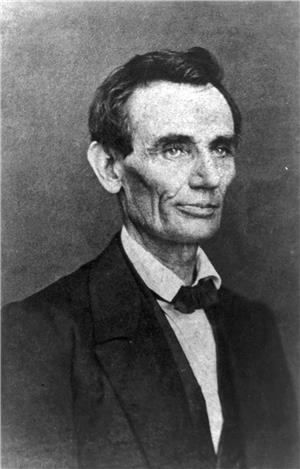On November 22, 1860, news reaches Olympia, Washington, that preliminary returns from the November 6, 1860, election show that Abraham Lincoln (1809-1865) is ahead in 18 of 33 states and will most likely be elected president of the United States. It takes 16 days for this news to reach Olympia via telegraph, horseback, and steamer.
Hearty Cheers
The report placed Abraham Lincoln ahead in 18 of the 33 states of the union and receiving 183 of 303 electoral votes. These reports were almost on the mark: The final election results gave Lincoln the victory in 18 states. He won 180 electoral votes. Voters in territories, including the Territory of Washington, could not vote for the U. S. President but only for members of the Territorial Legislature, for county and town officials, and for a non-voting delegate to the U.S. Congress. That did not prevent Washington state residents from celebrating.
When news of Lincoln's election reached Puget Sound towns, a celebration broke out with "boisterous hurrahs." At Tum-Water (later Tumwater), the Republicans gave a 100-gun salute followed by "a large and enthusiastic delegation [that] marched to Olympia, ringing bells, blowing horns, and attesting their joy in every conceivable manner. They adjourned with hearty cheers for 'honest old Abe,' the President elect of the United States" (Washington Standard).
Residents of Steilacoom responded by firing a gun salute for each of the free slave states. "Unfortunately for the patriotism of the participants in the glorification, they could not give vent to their joy by burning powder alone, but must needs call in the aid of some fighting whisky, which soon had the usual effect" (Puget Sound Herald). A few fights broke out and a few participants were jailed. Residents in Port Townsend also rejoiced in celebration.
News Flash
On November 7, 1860, the preliminary election results from nearly all of the 33 states of the union were telegraphed to St. Louis. (Telegraph messages were sent over wires by Morse code.) The results were summarized and telegraphed to Fort Kearny, Nebraska. Telegraph wires had yet to be strung west of Fort Kearny. Therefore, on November 8, 1860, the Pony Express, based at Fort Kearny, began the nearly 2,000-mile horseback journey across the continent and arrived at Fort Churchill, Nevada, the Pony Express terminus, in six days. Fort Churchill is located 30 miles from Carson City.
The following morning, on November 15, 1860, the election returns were telegraphed from Fort Churchill to Sacramento, California (wires had been strung between these two places). Later that day, the news was telegraphed from Sacramento to Yreka in northern California. It is likely that news of Lincoln's victory was taken from Yreka to Portland, Oregon, by horseback. On November 19, the Portland Daily Advertiser printed the results.
It was immediately sent to the head of the Cowlitz River by steamboat and from there to Olympia on horseback, where it arrived on the morning of November 22, 1860. That afternoon it reached Steilacoom. Port Townsend got the news by the mail steamboat Eliza Anderson on the morning of November 27.
Time and Distance Annihilated in Three Weeks
One of the Olympia papers remarked on how quickly communication crossed the continent. "Here, in this remote region, are we, this 22d day of November, able to give to our readers the result of the great Presidential struggle, which took place in so many States at points so remote, on the 6th of the same month. The annihilation ... [of] time and distance seems incomprehensible ... ." (Washington Standard).

